Kunzea glabrescens, commonly known as spearwood, is a flowering plant in the myrtle family, Myrtaceae and is endemic to the south-west of Western Australia. It is a large shrub with leaves and flowers similar to those of K. ericifolia but has differently shaped bracteoles. It is often common in wet areas around Perth.

Kunzea pulchella, commonly known as granite kunzea, is a flowering plant in the myrtle family, Myrtaceae and is endemic to the south-west of Western Australia. It is a shrub with spreading branches, egg-shaped to lance-shaped leaves and loose groups of red flowers, each on a short stalk so that the branch is visible between the flowers.

Kunzea baxteri, commonly known as scarlet kunzea, is a flowering plant in the myrtle family Myrtaceae, and is endemic to the south-west of Western Australia where it occurs near granite outcrops and hills. It is a shrub with large, scarlet, bottlebrush-like flower clusters, making it popular as a garden feature.

Kunzea jucunda is a flowering plant in the myrtle family, Myrtaceae and is endemic to the south-west of Western Australia where it occurs on sandy or rocky soils of undulating plains. It is similar to Kunzea affinis and where the ranges of the two species overlap, hybrids occur.
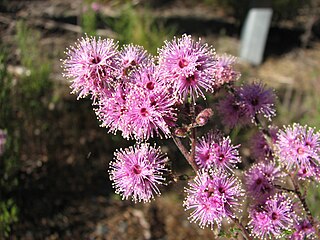
Kunzea parvifolia, commonly known as the violet kunzea, is a flowering plant in the myrtle family, Myrtaceae and is endemic to eastern Australia. It is a wiry shrub with small, narrow leaves and clusters of pink to purple flowers in spring.
Kunzea acuminata is a flowering plant in the myrtle family, Myrtaceae and is endemic to the south-west of Western Australia where it has a restricted distribution. It is a shrub with a few spindly branches, silky leaves and spherical groups of pink flowers on the ends of the branches.
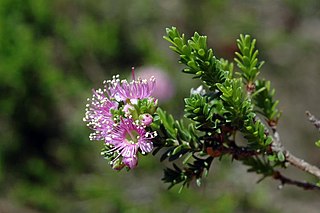
Kunzea ciliata is a flowering plant in the myrtle family, Myrtaceae and is endemic to the south-west of Western Australia. It is a spreading shrub which typically grows to a height of 0.8 to 1.5 metres and blooms between October and November producing pink flowers.
Kunzea cincinnata is a flowering plant in the myrtle family, Myrtaceae and is endemic to a small area on the south coast of Western Australia. It is a shrub which typically grows to a height of 0.6 to 1 metre and blooms between September and October producing pink to red-purple flowers.

Kunzea clavata, commonly known as the Torbay spearwood, is a flowering plant in the myrtle family, Myrtaceae and is endemic to a small area on the south coast of Western Australia. It is a shrub or tree, typically with many branches and grows to a height of 2.5 to 4 metres. It blooms between September and October producing yellow flowers.
Kunzea eriocalyx is a flowering plant in the myrtle family, Myrtaceae and is endemic to a small area on the south coast of Western Australia. It is a shrub with spreading main stems with a few short side branches and which grows to a height of 0.5 to 1 metre. It blooms between August and October producing pink flowers.

Kunzea micrantha is a flowering plant in the myrtle family, Myrtaceae and is endemic to the south west of Western Australia. It blooms between September and December producing pink-purple to white-cream flowers. A widespread and variable species, it is difficult to distinguish from K. praestans and from K. micromera where their range overlap.
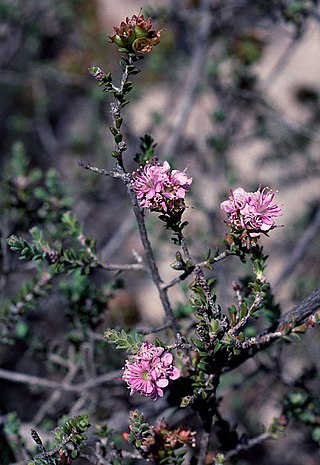
Kunzea micromera is a flowering plant in the myrtle family, Myrtaceae and is endemic to the south west of Western Australia. It is a small, sparse shrub, similar in some respects to K. micrantha but has shorter, more rounded sepal lobes. It produces groups of pink flowers on the ends of a few long shoots in spring.

Kunzea newbeyi is a flowering plant in the myrtle family, Myrtaceae and is endemic to a small area along the south coast of Western Australia. It is a robust shrub with small leaves and groups of about twenty to thirty pink flowers in October and November.
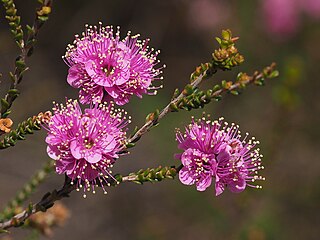
Kunzea rostrata is a species of flowering plant in the myrtle family, Myrtaceae and is endemic to an area along the south west coast of Western Australia. It is a shrub with small, mostly elliptic leaves and with groups of between mostly eleven and fifteen rose pink flowers mainly on the ends of branches that continue to grow after flowering.

Kunzea similis is a species of flowering plant in the myrtle family, Myrtaceae and is endemic to a small area along the south coast of Western Australia. It is a shrub with linear to lance-shaped leaves with a single vein, and spherical groups of between four and ten pink flowers on the ends of shoots.

Kunzea pauciflora, the Mount Melville kunzea, is a species of flowering plant in the myrtle family Myrtaceae, and is endemic to a small area on the south coast of Western Australia. It is a shrub with the stems densely branched near their ends, linear leaves and one, two or three pink flowers near the ends of the branches but usually only at the top of the shrub.

Kunzea praestans is a flowering plant in the myrtle family, Myrtaceae and is endemic to Western Australia. It is an erect shrub with sessile leaves and groups of about fourteen to twenty pink flowers in more or less spherical groups on the end of the branches.
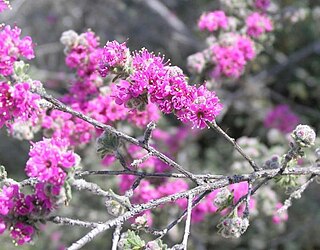
Kunzea preissiana is a flowering plant in the myrtle family, Myrtaceae, and is endemic to the southwest of Western Australia. It is a shrub with hairy branches and leaves, pink to mauve flowers in groups on the ends of shoots, and twenty to thirty stamens about the same length as the petals. It is a widespread, often locally common species across its range.
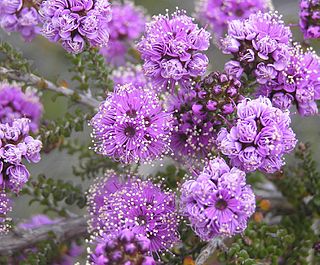
Kunzea recurva is a flowering plant in the myrtle family, Myrtaceae and is endemic to Western Australia. It is an uncommon shrub with small leaves and groups of pink or purplish flowers on the ends of the branches.
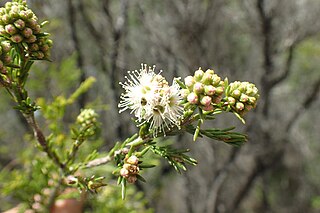
Kunzea spathulata is a species of flowering plant in the myrtle family, Myrtaceae and is endemic to a small area in the south west of Western Australia. It is a tall shrub with erect, much-branched stems, linear leaves and more or less spherical groups of yellow or yellowish green flowers.















